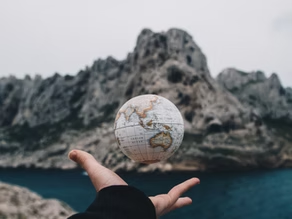13 Reasons Why Your Vacations Will Drastically Change Post COVID-19

The COVID-19 pandemic has drastically changed things around the globe, some particular to countries and others felt all over. It continues to cause the loss of many lives and jobs all over the world but has also allowed the earth time to recover from human activities and families to spend more time together. Travel, which is something we all probably took for granted before this pandemic, is going through a huge shift. There are many safety issues that have come into focus with traveling and many changes to come with the way we traverse between even the closest and most common destinations. Forget about that backpacking across Europe trip, because now even traveling between the grocery store and your house is a dangerous journey. Yes, there will be drastic changes in the way we live and travel from now, but are all of them bad? Are all these new changes necessarily as depressing as they seem to be? Let’s look at our handpicked 13 reasons why (pun intended) travel is going to change! 1. Masks, gloves, and sanitizer – the Golden Trio of essentials Masks have now become the new smartphone The new alpha delta beta has arrived, and it’s unfortunately not as exciting as it sounds. Masks, gloves, and sanitizers will now become literal essentials for all kinds of trips, be it to the local hardware store or a short business trip. You’ll be hard-pressed to find people without their masks on for at least the next 8-10 months in all kinds of public spaces, whether internal or external. When we talk about air travel, this will be a definite show, and you should ensure that you carry at least your mask and a small size sanitizer when going anywhere – if there’s one thing research and experience has proved, it’s that personal hygiene and distance is a sure way to protect yourself from the virus. There’s a blog on The Unicef website that has a lot of useful, research-based information on staying safe and keeping your family safe during the virus which we recommend everyone should read. TTW Pro Tip: Make sure that when you come back from a trip to the grocery store you wash/clean with sanitizer all your items for precaution against the virus – we don’t know how many hands have touched that block of cheese or box of cereal. 2. Old school road trips will make a comeback Road trips are memorable, less expensive, and much more fun A report published by The New York Times said that interest in RV and car purchases has risen exponentially due to Millenials preferring to hit the road. The interest in road trips has been on the rise for a while now as generations start to prefer the freedom and unrestricted nature of the same and this interest is only going to rise as people take to the most easily accessible way to travel and get out. Road trips are a built-in way to socially distance and explore uncharted territory, something you can’t do in other forms of travel. They offer not just safety and health protection but also convenience and flexibility, although long road trips may not be feasible for some time to come. This article by the Los Angeles Times talks more about how road trips will change and be more popular post COVID-19. TTW Pro Tip: Most countries have an official government-mandated/created app for contact tracing of coronavirus patients which will help you identify which areas are safe and which aren’t while traveling, sometimes down to the street or specific road. You can see the full list and find your own country’s app on this Wikipedia page. 3. Hotels will adopt higher standards Hotels will need to adopt new processes Many hotels and other hospitality companies in the industry are facing the heat of COVID-19, not just financially but also through the media – various hotels have been accused of not following proper protocol and existing hygiene standards for the safety of their consumers. Top hotel brands and chains such as Marriot, Taj, etc. have recently started announcing a string of measures they’re taking in their properties to ensure not just current safety and precaution for guests staying in their hotels but also essential hygiene and safety for the months/years to come. These permanent changes are supposed to drive for change in the rest of the industry and experts predict major shifts in how hotels will be cleaned, managed, staffed, checked for safety and health precautions, etc. Guest interaction with staff aside from the essentials is said to reduce in the future and practices of personal hygiene and tmperature checking (both of guests and staff) said to be strictly followed later on in hotels. However, it is always recommended you follow your own practices and methods to stay safe and healthy – check out this article on essential hotel hygiene for more information. TTW Pro Tip: Avoid staying in hotels as far as you can, but if you chose to/have no other option, call the hotel ahead in time and tell them you want a spot-clean in your presence – this way you’ll be able to make sure the sheets and pillows are fresh, the glasses are new, etc. 4. Villas and isolated ways to stay will be preferred Villas afford space, privacy, and safety Experts predict a rise in the number of villa bookings in the future and a growing preference for isolated ways to stay, for example, homes to rent, cottages, luxury villa resorts, motorhomes, etc. There has already been a surge of pre-bookings for villas seen by many (mostly in the US) travel companies spread almost a year from now. It’s easy to see why – isolated ways to stay, such as villas, not only allow for social distancing but also afford a larger space to stay for families and a place to cook their own meals

